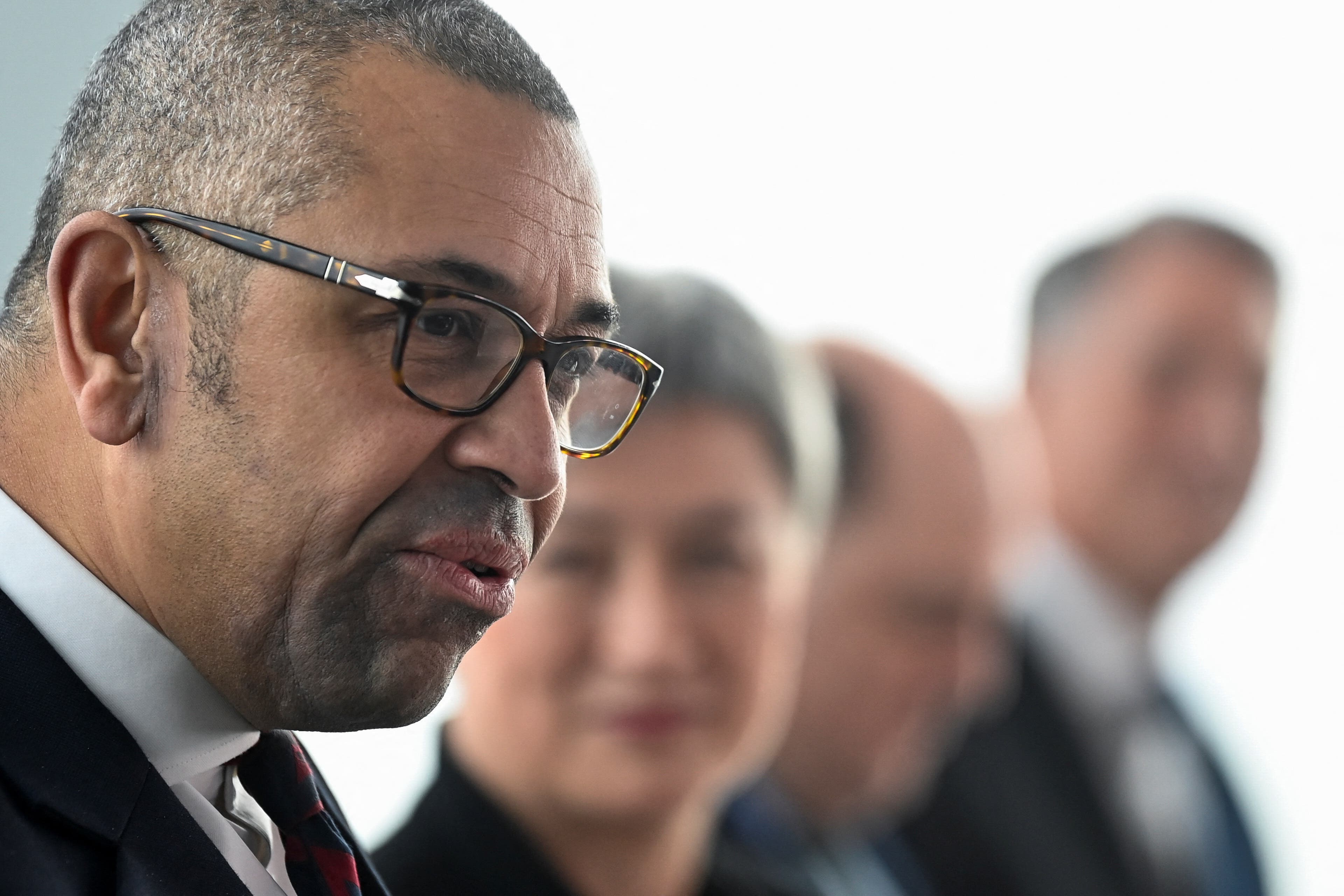No tension between UK and Australia on colonial past, says Foreign Secretary
James Cleverly was speaking after Australia’s foreign minister had urged Britain to confront its ‘uncomfortable’ history in the Indo-Pacific.

Your support helps us to tell the story
From reproductive rights to climate change to Big Tech, The Independent is on the ground when the story is developing. Whether it's investigating the financials of Elon Musk's pro-Trump PAC or producing our latest documentary, 'The A Word', which shines a light on the American women fighting for reproductive rights, we know how important it is to parse out the facts from the messaging.
At such a critical moment in US history, we need reporters on the ground. Your donation allows us to keep sending journalists to speak to both sides of the story.
The Independent is trusted by Americans across the entire political spectrum. And unlike many other quality news outlets, we choose not to lock Americans out of our reporting and analysis with paywalls. We believe quality journalism should be available to everyone, paid for by those who can afford it.
Your support makes all the difference.The Foreign Secretary said there was “no tension” between the UK and Australia after a visiting minister urged Britain to confront its “uncomfortable” colonial past.
James Cleverly said it was not possible to “erase your history”, but it was important that London was “conscious” of it when dealing with former colonial countries such as Australia.
The UK Government is looking to forge stronger ties in the Indo-Pacific to counter China’s growing influence in the region, with Canberra seen as a key ally.
But Penny Wong, Australia’s Malaysia-born foreign minister, told an audience at King’s College London this week that countries such as Britain needed to tackle their colonial past if they were to establish links in the region.
She said her grandmother had worked as a domestic servant for “British colonialists”, some of whom had tobacco and timber plantations.
“Such stories can sometimes feel uncomfortable – for those whose stories they are, and for those who hear them,” Ms Wong said on Tuesday.
“But understanding the past enables us to better share the present and the future.”
There has been no tension, no awkwardness
Mr Cleverly, asked about the remarks at a joint UK-Australia press briefing in Portsmouth, said he and his counterpart had discussed colonialism during their two-day talks.
Australia remains part of the Commonwealth, having been colonised as part of the British Empire in the late 18th century. Historians have highlighted examples of poor treatment of Aboriginal Australians during British rule.
Cabinet minister Mr Cleverly said the pair did discuss “the nature of the relationship between the UK and other countries which are now in the Commonwealth, but which were previously British colonies”.
But he added: “It was not the mainstay of the conversations we’ve been having.
“The mainstay of the conversations we have been having is about our future joint work, our joint endeavours with regard to security, prosperity, technological advancement.
“Where we did touch upon the history, the UK’s history and our relationship with the world was in recognising you cannot eradicate or erase your history, so you have to be conscious of it.
“I think it is incumbent upon the UK, in our dealings with Australia or any other country with which we were once a colonial power, to recognise that we need to demonstrate that this is a modern partnership, a partnership of equals – different but equal, geographically separated but emotionally and historically bound.”
He added: “There has been no tension, no awkwardness.”
One of the major points of agreement during the UK-Australia ministerial summit was on Aukus, a trilateral defence programme between the UK, the US and Australia to provide Canberra with nuclear-powered submarines.
Australian defence minister Richard Marles said the submarine plan was a “huge moment in our country’s history”.
“This will change Australia’s international personality, it will dramatically build our capability, and with that, our sovereignty,” he told reporters in Portsmouth.
“The significance of Britain and America working together to help us have that technology is one which, in international terms, is also highly significant.”
UK Defence Secretary Ben Wallace said supplying the vessels was a recognition of the need to stand up to countries threatening the “rules-based” international system.
“It is important that we recognise that, sadly, the rules-based order is under threat like never before, human rights are being threatened by a range of characters around the world and people are testing the sovereignty of nation states in a way that should worry us all,” he said.
“Whether you are in Ukraine or in the far Pacific, from the UK’s point of view those values are true and worth standing up for.”
Mr Wallace said the Aukus pact was “about delivering some actual hard power… behind that aspiration to stand up for the rules-based system”.
The collaboration came following the publication of the Integrated Review of Security, Defence, Development and Foreign Policy in 2021, announcing a UK “tilt” towards the Indo-Pacific.
Before the press briefing, the four ministers enjoyed lunch together on HMS Victory, Lord Nelson’s flagship at the Battle of Trafalgar.
As well as visiting the south coast, the foreign and defence ministers also travelled to Salisbury Plain on Wednesday where they saw British and Australian forces, alongside other international allies, train Ukrainian troops.
Mr Marles and Ms Wong both remarked at how “moving” they found the experience.
Describing the training they viewed, Mr Marles, who is also Australia’s deputy prime minister, said: “That will save lives and contribute to the effort that will keep Ukraine in the fight so they can determine the end of this conflict on their own terms.
“The seriousness of that was very impressive.”